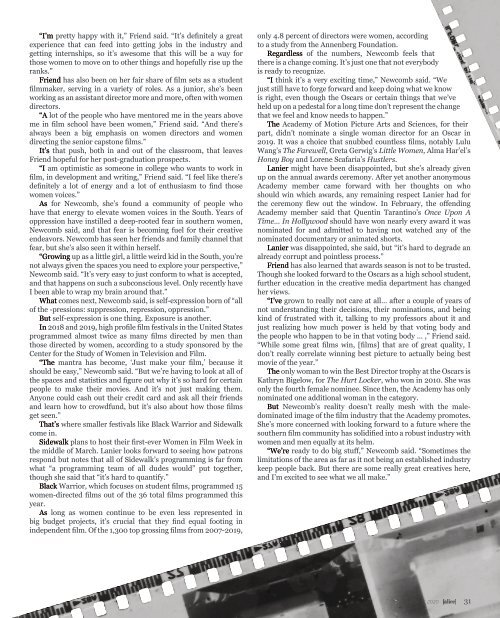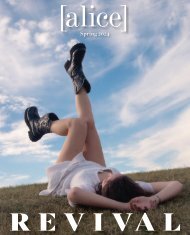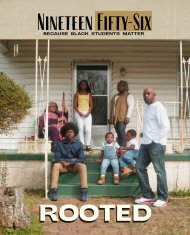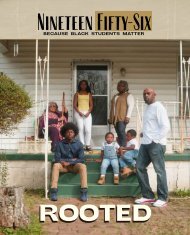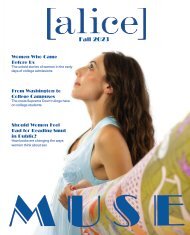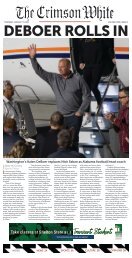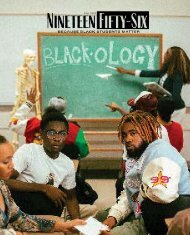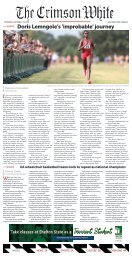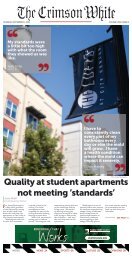You also want an ePaper? Increase the reach of your titles
YUMPU automatically turns print PDFs into web optimized ePapers that Google loves.
“I’m pretty happy with it,” Friend said. “It’s definitely a great<br />
experience that can feed into getting jobs in the industry and<br />
getting internships, so it’s awesome that this will be a way for<br />
those women to move on to other things and hopefully rise up the<br />
ranks.”<br />
Friend has also been on her fair share of film sets as a student<br />
filmmaker, serving in a variety of roles. As a junior, she’s been<br />
working as an assistant director more and more, often with women<br />
directors.<br />
“A lot of the people who have mentored me in the years above<br />
me in film school have been women,” Friend said. “And there’s<br />
always been a big emphasis on women directors and women<br />
directing the senior capstone films.”<br />
It’s that push, both in and out of the classroom, that leaves<br />
Friend hopeful for her post-graduation prospects.<br />
“I am optimistic as someone in college who wants to work in<br />
film, in development and writing,” Friend said. “I feel like there’s<br />
definitely a lot of energy and a lot of enthusiasm to find those<br />
women voices.”<br />
As for Newcomb, she’s found a community of people who<br />
have that energy to elevate women voices in the South. Years of<br />
oppression have instilled a deep-rooted fear in southern women,<br />
Newcomb said, and that fear is becoming fuel for their creative<br />
endeavors. Newcomb has seen her friends and family channel that<br />
fear, but she’s also seen it within herself.<br />
“Growing up as a little girl, a little weird kid in the South, you’re<br />
not always given the spaces you need to explore your perspective,”<br />
Newcomb said. “It’s very easy to just conform to what is accepted,<br />
and that happens on such a subconscious level. Only recently have<br />
I been able to wrap my brain around that.”<br />
What comes next, Newcomb said, is self-expression born of “all<br />
of the -pressions: suppression, repression, oppression.”<br />
But self-expression is one thing. Exposure is another.<br />
In 2018 and 2019, high profile film festivals in the United States<br />
programmed almost twice as many films directed by men than<br />
those directed by women, according to a study sponsored by the<br />
Center for the Study of Women in Television and Film.<br />
“The mantra has become, ‘Just make your film,’ because it<br />
should be easy,” Newcomb said. “But we’re having to look at all of<br />
the spaces and statistics and figure out why it’s so hard for certain<br />
people to make their movies. And it’s not just making them.<br />
Anyone could cash out their credit card and ask all their friends<br />
and learn how to crowdfund, but it’s also about how those films<br />
get seen.”<br />
That’s where smaller festivals like Black Warrior and Sidewalk<br />
come in.<br />
Sidewalk plans to host their first-ever Women in Film Week in<br />
the middle of March. Lanier looks forward to seeing how patrons<br />
respond but notes that all of Sidewalk’s programming is far from<br />
what “a programming team of all dudes would” put together,<br />
though she said that “it’s hard to quantify.”<br />
Black Warrior, which focuses on student films, programmed 15<br />
women-directed films out of the 36 total films programmed this<br />
year.<br />
As long as women continue to be even less represented in<br />
big budget projects, it’s crucial that they find equal footing in<br />
independent film. Of the 1,300 top grossing films from 2007-2019,<br />
only 4.8 percent of directors were women, according<br />
to a study from the Annenberg Foundation.<br />
Regardless of the numbers, Newcomb feels that<br />
there is a change coming. It’s just one that not everybody<br />
is ready to recognize.<br />
“I think it’s a very exciting time,” Newcomb said. “We<br />
just still have to forge forward and keep doing what we know<br />
is right, even though the Oscars or certain things that we’ve<br />
held up on a pedestal for a long time don’t represent the change<br />
that we feel and know needs to happen.”<br />
The Academy of Motion Picture Arts and Sciences, for their<br />
part, didn’t nominate a single woman director for an Oscar in<br />
2019. It was a choice that snubbed countless films, notably Lulu<br />
Wang’s The Farewell, Greta Gerwig’s Little Women, Alma Har’el’s<br />
Honey Boy and Lorene Scafaria’s Hustlers.<br />
Lanier might have been disappointed, but she’s already given<br />
up on the annual awards ceremony. After yet another anonymous<br />
Academy member came forward with her thoughts on who<br />
should win which awards, any remaining respect Lanier had for<br />
the ceremony flew out the window. In February, the offending<br />
Academy member said that Quentin Tarantino’s Once Upon A<br />
Time… In Hollywood should have won nearly every award it was<br />
nominated for and admitted to having not watched any of the<br />
nominated documentary or animated shorts.<br />
Lanier was disappointed, she said, but “it’s hard to degrade an<br />
already corrupt and pointless process.”<br />
Friend has also learned that awards season is not to be trusted.<br />
Though she looked forward to the Oscars as a high school student,<br />
further education in the creative media department has changed<br />
her views.<br />
“I’ve grown to really not care at all… after a couple of years of<br />
not understanding their decisions, their nominations, and being<br />
kind of frustrated with it, talking to my professors about it and<br />
just realizing how much power is held by that voting body and<br />
the people who happen to be in that voting body … ,” Friend said.<br />
“While some great films win, [films] that are of great quality, I<br />
don’t really correlate winning best picture to actually being best<br />
movie of the year.”<br />
The only woman to win the Best Director trophy at the Oscars is<br />
Kathryn Bigelow, for The Hurt Locker, who won in 2010. She was<br />
only the fourth female nominee. Since then, the Academy has only<br />
nominated one additional woman in the category.<br />
But Newcomb’s reality doesn’t really mesh with the maledominated<br />
image of the film industry that the Academy promotes.<br />
She’s more concerned with looking forward to a future where the<br />
southern film community has solidified into a robust industry with<br />
women and men equally at its helm.<br />
“We’re ready to do big stuff,” Newcomb said. “Sometimes the<br />
limitations of the area as far as it not being an established industry<br />
keep people back. But there are some really great creatives here,<br />
and I’m excited to see what we all make.”<br />
Spring 2020 31


